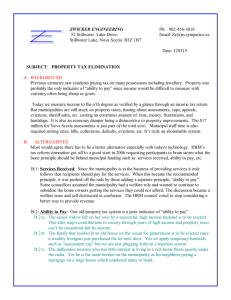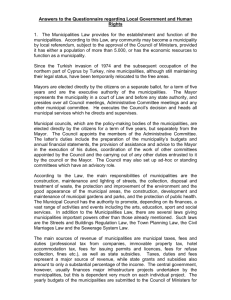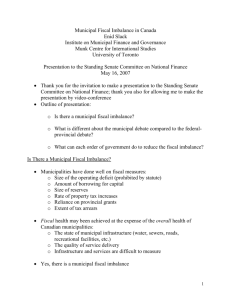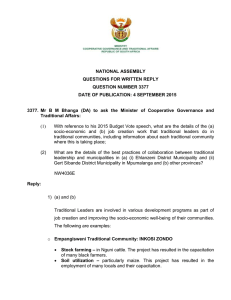Local Government Fin..
advertisement
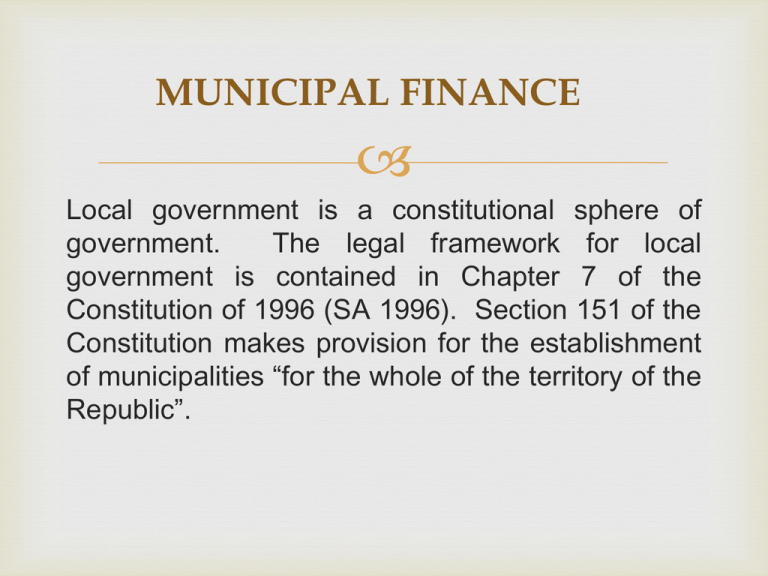
MUNICIPAL FINANCE Local government is a constitutional sphere of government. The legal framework for local government is contained in Chapter 7 of the Constitution of 1996 (SA 1996). Section 151 of the Constitution makes provision for the establishment of municipalities “for the whole of the territory of the Republic”. Objects of Local Government Provide democratic and accountable government Ensure provision of service to communities in a sustainable manner Promote social and economic development Promote a safe and healthy environment Encourage the involvement of communities and community organisations in matters of local government The Role of Local Government Promoting democracy Ensuring that government is efficient effective in the rendering of services and Promoting social and economic development. MUNICIPAL FINANCE Municipalities require financial resources to realise their constitutional obligations Democracy – delivery of service – development The ability of municipalities to generate and spend financial resources is at the heart of municipal governance Municipal Fiscal Capacity Municipal fiscal capacity reflects the ability of a municipality to raise revenue for public spending. This capacity is determined the following: The level of economic activity within the boundaries of the jurisdiction and the government’s ability to translate this economic activity into public revenues. The ability to transform the economic base into public revenues is determined with available taxing powers and tax administration capacity. Fiscal Capacity Without adequate financial resources, municipalities will not be able to achieve their objectives. Therefore municipalities require sufficient financial resources from its own revenue base and predictable intergovernmental transfers in order to efficiently provide functions in a way that is responsive to local communities Municipal Fiscal Power Section 229 of the Constitution – Municipality may impose – Rates on property and surcharge on fees provided by or on behalf of the municipality; and If authorised by national legislation, other taxes, levies and duties appropriate to local government or to the category of local government into which that municipality falls, but no municipality may impose income tax, value-added tax, general sales tax or customs duties. Fiscal Autonomy Municipal Fiscal Autonomy means that local governments have the power to create their own sources of revenue in addition to their equitable share in the national taxes released by the national government, as well as the power to allocate their resources in accordance with their own priorities. Exercise 1 ADVANTAGES DISADVANTAGES GIVE EXAMPLES GIVE EXAMPLES Accountability Lack of Technical Capacity Improved Revenue Mobilization Horizontal fiscal imbalance Subsidiarity Maintenance of National Norms and Standards Responsiveness Lack Fiscal Discipline Basic calculation of revenue autonomy Revenue Autonomy = Municipality’s Own Revenue Municipality’s Total Revenue A key indicator of revenue autonomy from a municipal perspective is its ability to generate more revenue from its communities. Finance Management Municipalities are the custodians of public funds, whether raised from their own revenues or received through intergovernmental grants. They are tasked with using these resources to respond to the needs of their communities for infrastructure, local services such as water, electricity and refuse removal and enabling and guiding the spatial development of their localities. The Current Finance Management Situation Growing grant depedency Asset maintenance and life-cycle management are very weak as the low levels of maintenance expenditure reflect. Service backlogs for previously ignored communities are coming up against significant cost pressures that partially result from inappropriate decisions by municipalities on the level of service to be provided. Weak investment in infrastructure for local economic development Declining quality of service are growing constraints to economic growth and poverty reduction Exercise 2 What could be the reasons for the failure of your municipality to address finance management challenges?



